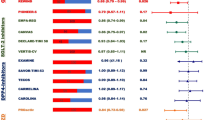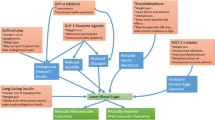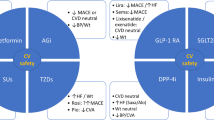Abstract
Previous trials of glucose-lowering strategies in subjects with type 2 diabetes have demonstrated a beneficial effect of intensive glycemic control on microvascular complications but failed to show a clear benefit on cardiovascular complications. The findings of meta-analyses of rosiglitazone trials suggesting that rosiglitazone might increase the risk of myocardial infarction have cast doubt on the cardiovascular safety of glucose-lowering drugs. In 2008, the US Food and Drug Administration has implemented rigorous criteria to approve new glucose-lowering drugs, requiring proof of cardiovascular safety. These regulatory requirements have led to a considerable increase in the number of cardiovascular outcome trials in type 2 diabetes to ensure that newer glucose-lowering drugs are not associated with increased cardiovascular risk. Incretin-based therapies including dipeptidyl peptidase 4 (DPP-4) inhibitors, and injectable glucagon-like peptide 1 (GLP-1) receptor agonists are novel treatment options for patients with inadequate glucose control. Although DPP-4 inhibitors have shown neutral effects on risk factors for cardiovascular diseases, it remains unclear whether treatment with these new glucose-lowering agents might be associated with a reduction in cardiovascular events. The results of the three cardiovascular outcome trials comparing DPP-4 inhibitors treatment to placebo in addition to other glucose-lowering drugs have been published. All the three DPP-4 inhibitor cardiovascular outcome trials have shown non-inferiority with regard to cardiovascular safety, compared with placebo, when added to usual care. In this review, we summarize cardiovascular outcome trials of DPP-4 inhibitors, and provide an overview of these trials and their limitations.

Similar content being viewed by others
References
Emerging Risk Factors Collaboration, N. Sarwar, P. Gao, S.R. Seshasai, R. Gobin, S. Kaptoge, E. Di Angelantonio, E. Ingelsson, D.A. Lawlor, E. Selvin, M. Stampfer, C.D. Stehouwer, S. Lewington, L. Pennells, A. Thompson, N. Sattar, I.R. White, K.K. Ray, J. Danesh, N. Sarwar, P. Gao, S.R. Seshasai, Diabetes mellitus, fasting blood glucose concentration, and risk of vascular disease: a collaborative meta-analysis of 102 prospective studies. Lancet 375, 2215–2222 (2010)
A.D. Shah, C. Langenberg, E. Rapsomaniki, S. Denaxas, M. Pujades-Rodriguez, C.P. Gale, J. Deanfield, L. Smeeth, A. Timmis, H. Hemingway, Type 2 diabetes and incidence of cardiovascular diseases: a cohort study in 1.9 million people. Lancet Diabetes Endocrinol. 3, 105–113 (2015)
Emerging Risk Factors Collaboration, S.R. Seshasai, S. Kaptoge, A. Thompson, E. Di Angelantonio, P. Gao, N. Sarwar, P.H. Whincup, K.J. Mukamal, R.F. Gillum, I. Holme, I. Njølstad, A. Fletcher, P. Nilsson, S. Lewington, R. Collins, V. Gudnason, S.G. Thompson, N. Sattar, E. Selvin, F.B. Hu, J. Danesh, Diabetes mellitus, fasting glucose, and risk of cause-specific death. N. Engl. J. Med. 364, 829–841 (2011)
M. Federici, R. Menghini, A. Mauriello, M.L. Hribal, F. Ferrelli, D. Lauro, P. Sbraccia, L.G. Spagnoli, G. Sesti, R. Lauro, Insulin-dependent activation of endothelial nitric oxide synthase is impaired by O-linked glycosylation modification of signaling proteins in human coronary endothelial cells. Circulation 106, 466–472 (2002)
M. Brownlee, The pathobiology of diabetic complications: a unifying mechanism. Diabetes 54, 1615–1625 (2005)
T.V. Fiorentino, T. Procopio, E. Mancuso, G.P. Arcidiacono, F. Andreozzi, F. Arturi, A. Sciacqua, F. Perticone, M.L. Hribal, G. Sesti, SRT1720 counteracts glucosamine-induced endoplasmic reticulum stress and endothelial dysfunction. Cardiovasc. Res. 107, 295–306 (2015)
UK Prospective Diabetes Study (UKPDS) Group, Intensive blood-glucose control with sulphonylureas or insulin compared with conventional treatment and risk of complications in patients with type 2 diabetes (UKPDS 33). Lancet 352, 837–853 (1998)
UK Prospective Diabetes Study (UKPDS) Group, Effect of intensive blood-glucose control with metformin on complications in overweight patients with type 2 diabetes (UKPDS 34). UK Prospective Diabetes Study (UKPDS) Group. Lancet 352, 854–865 (1998)
The Action to Control Cardiovascular Risk in Diabetes Study Group, Effects of intensive glucose lowering in type 2 diabetes. N. Engl. J. Med. 358, 2545–2559 (2008)
The ADVANCE Collaborative Group, Intensive blood glucose control and vascular outcomes in patients with type 2 diabetes. N. Engl. J. Med. 358, 2560–2572 (2008)
W. Duckworth, C. Abraira, T. Moritz, D. Reda, N. Emanuele, P.D. Reaven, F.J. Zieve, J. Marks, S.N. Davis, R. Hayward, S.R. Warren, S. Goldman, M. McCarren, M.E. Vitek, W.G. Henderson, G.D. Huang, VADT Investigators: glucose control and vascular complications in veterans with type 2 diabetes. N. Engl. J. Med. 360, 129–139 (2009)
J.A. Dormandy, B. Charbonnel, D.J. Eckland, E. Erdmann, M. Massi-Benedetti, I.K. Moules, A.M. Skene, M.H. Tan, P.J. Lefèbvre, G.D. Murray, E. Standl, R.G. Wilcox, L. Wilhelmsen, J. Betteridge, K. Birkeland, A. Golay, R.J. Heine, L. Korányi, M. Laakso, M. Mokán, A. Norkus, V. Pirags, T. Podar, A. Scheen, W. Scherbaum, G. Schernthaner, O. Schmitz, J. Skrha, U. Smith, J. Taton, PROactive investigators: secondary prevention of macrovascular events in patients with type 2 diabetes in the PROactive Study (PROspective pioglitAzone Clinical Trial In macroVascular Events): a randomised controlled trial. Lancet 366, 1279–1289 (2005)
S.E. Nissen, K. Wolski, Effect of rosiglitazone on the risk of myocardial infarction and death from cardiovascular causes. N. Engl. J. Med. 356, 2457–2471 (2007)
S.E. Nissen, K. Wolski, Rosiglitazone revisited: an updated meta-analysis of risk for myocardial infarction and cardiovascular mortality. Arch. Intern. Med. 170, 1191–1201 (2010)
P.D. Home, S.J. Pocock, H. Beck-Nielsen, P.S. Curtis, R. Gomis, M. Hanefeld, N.P. Jones, M. Komajda, J.J. McMurray, RECORD Study Team.: rosiglitazone evaluated for cardiovascular outcomes in oral agent combination therapy for type 2 diabetes (RECORD): a multicentre, randomised, open-label trial. Lancet 373, 2125–2135 (2009)
Guidance for Industry: Diabetes Mellitus–Evaluating Cardiovascular Risk in New Antidiabetic Therapies to Treat Type 2 Diabetes. Silver Spring, MD: Food and Drug Administration (2008), http://www.fda.gov/downloads/Drugs/GuidanceComplianceRegulatoryInformation/Guidances/ucm071627.pdf. Accessed 30 July 2015
European Medicines Agency, in Guideline on clinical investigation of medicinal products in the treatment or prevention of diabetes mellitus, Committee for medicinal products for human use (London, 2012), http://www.ema.europa.eu/docs/enGB/documentlibrary/Scientificguidelines/2012/06/WC500129256.pdf. Accessed 30 July 2015
B. Gallwitz, Extra-pancreatic effects of incretin-based therapies. Endocrine 47, 360–371 (2014)
X. Qin, H. Shen, M. Liu, Q. Yang, S. Zheng, M. Sabo, D.A. D’Alessio, P. Tso, GLP-1 reduces intestinal lymph flow, triglyceride absorption, and apolipoprotein production in rats. Am. J. Physiol. Gastrointest. Liver Physiol. 288, G943–G949 (2005)
T. Okerson, R.J. Chilton, The cardiovascular effects of GLP-1 receptor agonists. Cardiovasc. Ther. 30, e146–e155 (2012)
L.A. Nikolaidis, D. Elahi, T. Hentosz, A. Doverspike, R. Huerbin, L. Zourelias, C. Stolarski, Y.T. Shen, R.P. Shannon, Recombinant glucagon-like peptide-1 increases myocardial glucose uptake and improves left ventricular performance in conscious dogs with pacing-induced dilated cardiomyopathy. Circulation 110, 955–961 (2004)
M. Arakawa, T. Mita, K. Azuma, C. Ebato, H. Goto, T. Nomiyama, Y. Fujitani, T. Hirose, R. Kawamori, H. Watada, Inhibition of monocyte adhesion to endothelial cells and attenuation of atherosclerotic lesion by a glucagon-like peptide-1 receptor agonist, exendin-4. Diabetes 59, 1030–1037 (2010)
M. Nagashima, T. Watanabe, M. Terasaki, M. Tomoyasu, K. Nohtomi, J. Kim-Kaneyama, A. Miyazaki, T. Hirano, Native incretins prevent the development of atherosclerotic lesions in apolipoprotein E knockout mice. Diabetologia 54, 2649–2659 (2011)
F.E. Palmieri, P.E. Ward, Dipeptidyl(amino)peptidase IV and post proline cleaving enzyme in cultured endothelial and smooth muscle cells. Adv. Exp. Med. Biol. 247, 305–311 (1989)
J.R. Ussher, D.J. Drucker, Cardiovascular biology of the incretin system. Endocr. Rev. 33, 187–215 (2012)
K.H. Ding, Q. Zhong, C.M. Isales, Glucose-dependent insulinotropic peptide stimulates thymidine incorporation in endothelial cells: role of endothelin-1. Am. J. Physiol. Endocrinol. Metab. 285, E390–E396 (2003)
D.J. Ceradini, A.R. Kulkarni, M.J. Callaghan, O.M. Tepper, N. Bastidas, M.E. Kleinman, J.M. Capla, R.D. Galiano, J.P. Levine, G.C. Gurtner, Progenitor cell trafficking is regulated by hypoxic gradients through HIF-1 induction of SDF-1. Nat. Med. 10, 858–864 (2004)
G.P. Fadini, E. Boscaro, M. Albiero, L. Menegazzo, V. Frison, S. de Kreutzenberg, C. Agostini, A. Tiengo, A. Avogaro, The oral dipeptidyl peptidase-4 inhibitor sitagliptin increases circulating endothelial progenitor cells in patients with type 2 diabetes: possible role of stromal-derived factor-1alpha. Diabetes Care 33, 1607–1609 (2010)
T. Shigeta, M. Aoyama, Y.K. Bando, A. Monji, T. Mitsui, M. Takatsu, X.W. Cheng, T. Okumura, A. Hirashiki, K. Nagata, T. Murohara, Dipeptidyl peptidase-4 modulates left ventricular dysfunction in chronic heart failure via angiogenesis-dependent and -independent actions. Circulation 126, 1838–1851 (2012)
R. Bentley-Lewis, D. Aguilar, M.C. Riddle, B. Claggett, R. Diaz, K. Dickstein, H.C. Gerstein, P. Johnston, L.V. Køber, F. Lawson, E.F. Lewis, A.P. Maggioni, J.J. McMurray, L. Ping, J.L. Probstfield, S.D. Solomon, J.C. Tardif, Y. Wu, M.A. Pfeffer, ELIXA Investigators, Rationale, design, and baseline characteristics in Evaluation of LIXisenatide in acute coronary syndrome, a long-term cardiovascular end point trial of lixisenatide versus placebo. Am. Heart J. 169, 631–638.e7 (2015)
B.M. Scirica, D.L. Bhatt, E. Braunwald, P.G. Steg, J. Davidson, B. Hirshberg, P. Ohman, R. Frederich, S.D. Wiviott, E.B. Hoffman, M.A. Cavender, J.A. Udell, N.R. Desai, O. Mosenzon, D.K. McGuire, K.K. Ray, L.A. Leiter, I. Raz, SAVOR-TIMI 53 Steering Committee and Investigators: saxagliptin and cardiovascular outcomes in patients with type 2 diabetes mellitus. N. Engl. J. Med. 369, 1317–1326 (2013)
W.B. White, C.P. Cannon, S.R. Heller, S.E. Nissen, R.M. Bergenstal, G.L. Bakris, A.T. Perez, P.R. Fleck, C.R. Mehta, S. Kupfer, C. Wilson, W.C. Cushman, F. Zannad, EXAMINE Investigators: alogliptin after acute coronary syndrome in patients with type 2 diabetes. N. Engl. J. Med. 369, 1327–1335 (2013)
J.B. Green, M.A. Bethel, P.W. Armstrong, J.B. Buse, S.S. Engel, J. Garg, R. Josse, K.D. Kaufman, J. Koglin, S. Korn, J.M. Lachin, D.K. McGuire, M.J. Pencina, E. Standl, P.P. Stein, S. Suryawanshi, F. Van de Werf, E.D. Peterson, R.R. Holman, TECOS Study Group: effect of Sitagliptin on Cardiovascular Outcomes in Type 2 Diabetes. N. Engl. J. Med. 373, 232–242 (2015)
M. Monami, I. Iacomelli, N. Marchionni, E. Mannucci, Dipeptydil peptidase-4 inhibitors in type 2 diabetes: a meta-analysis of randomized clinical trials. Nutr. Metab. Cardiovasc. Dis. 20, 224–235 (2010)
M.E. Cobble, R. Frederich, Saxagliptin for the treatment of type 2 diabetes mellitus: assessing cardiovascular data. Cardiovasc. Diabetol. 11, 6 (2012)
K. Ray, S.R. Seshasai, S. Wijesuriya, R. Sivakumaran, S. Nethercott, D. Preiss, S. Erqou, N. Sattar, Effect of intensive control of glucose on cardiovascular outcomes and death in patients with diabetes mellitus: a meta-analysis of randomised controlled trials. Lancet 373, 1765–1772 (2009)
R.R. Holman, S.K. Paul, M.A. Bethel, D.R. Matthews, H.A. Neil, 10-year follow-up of intensive glucose control in type 2 diabetes. N. Engl. J. Med. 359, 1577–1589 (2008)
R.A. Hayward, P.D. Reaven, W.L. Wiitala, G.D. Bahn, D.J. Reda, L. Ge, M. McCarren, W.C. Duckworth, N.V. Emanuele, VADT Investigators: follow-up of glycemic control and cardiovascular outcomes in type 2 diabetes. N. Engl. J. Med. 372, 2197–2206 (2015)
V. Ritsinger, K. Malmberg, A. Mårtensson, L. Rydén, H. Wedel, A. Norhammar, Intensified insulin-based glycaemic control after myocardial infarction: mortality during 20 year follow-up of the randomised Diabetes Mellitus Insulin Glucose Infusion in Acute Myocardial Infarction (DIGAMI 1) trial. Lancet Diabetes Endocrinol. 2, 627–633 (2014)
N. Marx, J. Rosenstock, S.E. Kahn, B. Zinman, J.J. Kastelein, J.M. Lachin, M.A. Espeland, E. Bluhmki, M. Mattheus, B. Ryckaert, S. Patel, O.E. Johansen, H.J. Woerle, Design and baseline characteristics of the CARdiovascular Outcome Trial of LINAgliptin Versus Glimepiride in Type 2 Diabetes (CAROLINA®). Diab. Vasc. Dis. Res. 12, 164–174 (2015)
J.S. Yudkin, B. Richter, Gale EAM: intensified glucose lowering in type 2 diabetes: time for a reappraisal. Diabetologia 53, 2079–2085 (2010)
B.M. Scirica, E. Braunwald, I. Raz, M.A. Cavender, D.A. Morrow, P. Jarolim, J.A. Udell, O. Mosenzon, K. Im, A.A. Umez-Eronini, P.S. Pollack, B. Hirshberg, R. Frederich, B.S. Lewis, D.K. McGuire, J. Davidson, P.G. Steg, D.L. Bhatt, SAVOR-TIMI 53 Steering Committee and Investigators: heart failure, saxagliptin, and diabetes mellitus: observations from the SAVOR-TIMI 53 randomized trial. Circulation 130, 1579–1588 (2014)
F. Zannad, C.P. Cannon, W.C. Cushman, G.L. Bakris, V. Menon, A.T. Perez, P.R. Fleck, C.R. Mehta, S. Kupfer, C. Wilson, H. Lam, W.B. White, EXAMINE Investigators: heart failure and mortality outcomes in patients with type 2 diabetes taking alogliptin versus placebo in EXAMINE: a multicentre, randomised, double blind trial. Lancet 385, 2067–2076 (2015)
G. Savarese, P. Perrone-Filardi, C. D’Amore, C. Vitale, B. Trimarco, L. Pani, G.M. Rosano, Cardiovascular effects of dipeptidyl peptidase-4 inhibitors in diabetic patients: a meta-analysis. Int. J. Cardiol. 181, 239–244 (2015)
S. Suh, G.H. Seo, C.H. Jung, M.K. Kim, S.M. Jin, Y.C. Hwang, B.W. Lee, J.H. Kim, Increased risk of hospitalization for heart failure with newly prescribed dipeptidyl peptidase-4 inhibitors and pioglitazone using the Korean Health Insurance Claims Database. Diabetes Metab. J. 39, 247–252 (2015)
G.P. Fadini, A. Avogaro, L. Degli Esposti, P. Russo, S. Saragoni, S. Buda, G. Rosano, S. Pecorelli, L. Pani, OsMed Health-DB Network, Risk of hospitalization for heart failure in patients with type 2 diabetes newly treated with DPP-4 inhibitors or other oral glucose-lowering medications: a retrospective registry study on 127,555 patients from the Nationwide OsMed Health-DB Database. Eur. Heart J. 36, 2454–2462 (2015)
O.H. Yu, K.B. Filion, L. Azoulay, V. Patenaude, A. Majdan, S. Suissa, Incretin-based drugs and the risk of congestive heart failure. Diabetes Care 38, 277–284 (2015)
N. Mikhail, Effects of incretin-based therapy in patients with heart failure and myocardial infarction. Endocrine 47, 21–28 (2014)
Funding
Professor Giorgio Sesti has received consultancy fees from Merck, Novo Nordisk, Janssen, Servier, Astra Zeneca, Boehringer Ingelheim, Eli Lilly, Intarcia, and Sanofi; and speaking fees from Novo Nordisk, Merck, Boehringer Ingelheim, Eli Lilly, Sanofi, Janssen, and Novartis.
Author information
Authors and Affiliations
Corresponding author
Ethics declarations
Conflict of interest
Dr. Teresa Vanessa Fiorentino declares no conflict of interest
Rights and permissions
About this article
Cite this article
Fiorentino, T.V., Sesti, G. Lessons learned from cardiovascular outcome clinical trials with dipeptidyl peptidase 4 (DPP-4) inhibitors. Endocrine 53, 373–380 (2016). https://doi.org/10.1007/s12020-015-0811-7
Received:
Accepted:
Published:
Issue Date:
DOI: https://doi.org/10.1007/s12020-015-0811-7




